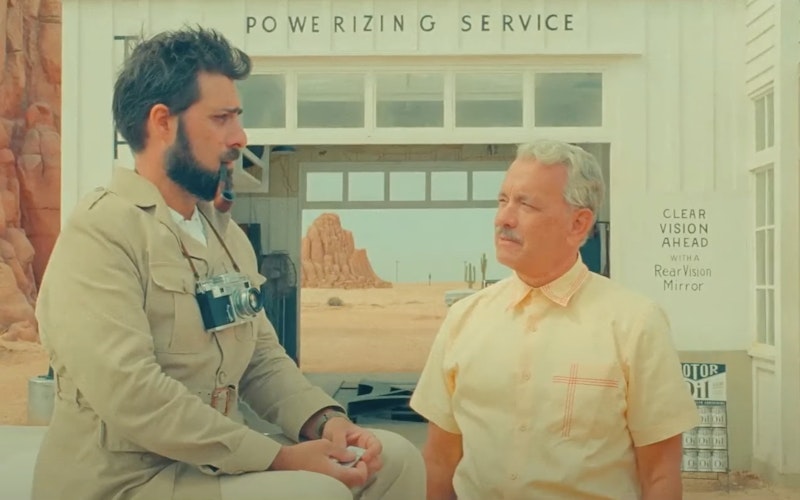
Movies
Asteroid City’s Preaching Tip
I can’t decide if preachers have one of the hardest jobs or one of the easiest.
Every week, they’re tasked with revisiting a well-worn text—the Holy Bible—and finding something new and relevant to say about it, all in the face of whatever anxieties and concerns parishioners have brought with them that Sunday. Some Sundays this may seem simple, yet other weeks the lectionary serves up something like Genesis 22 (Abraham’s call to sacrifice his son Isaac, which my own pastor wrestled with just a few weeks ago).
A preacher might find encouragement in Asteroid City, the latest comedy from writer-director Wes Anderson (Rushmore, The Grand Budapest Hotel, The French Dispatch). Another layer-cake narrative from the famously fastidious filmmaker, Asteroid City’s framing device is a black-and-white television documentary about the production of a play in the mid-1950s. We also see scenes from that play in widescreen color (in fact, this takes up most of the movie’s running time). Set in 1955 in the desert town of the title, the play follows a variety of characters who arrive in fictional Asteroid City to attend the annual Junior Stargazer convention, which is hosted by an experimental government agency that also happens to be conducting atom-bomb tests.
Among the vast cast—including Scarlett Johansson, Tom Hanks, Steve Carell, Tilda Swinton, Maya Hawke, and many others in variously sized roles—sits Anderson regular Jason Schwartzman. He plays Jones Hall, a stage actor cast in the play, as well as the character Hall portrays: Augie Steenbeck. A war photographer and recent widower chaperoning his “brainiac” son (Jake Ryan) and three young daughters to the Junior Stargazer convention, Augie has yet to tell his children about their mother’s passing some three weeks prior. Grief—a common theme for Anderson—permeates Asteroid City, but the movie is also about many other things: discovery, despair, acting, repression, America, outer space, and infinity, to name just a few.
It’s no wonder, then, that amidst all of this potential meaning we get a scene of Jones Hall, the actor, having a breakdown during one of the play’s performances. He marches backstage between his scenes—the blistered peach color scheme of the desert set transitioning to a stark, monochrome palette—to track down the play’s director (Adrien Brody). He confesses, in exasperation, that he doesn’t understand Augie, the character he’s playing, or, indeed, the play itself. What is the point? What are they doing here? What does it all mean? Brody’s director calmly replies, “Just keep telling the story.”
What does that passage in Genesis, where Abraham nearly sacrifices Isaac, mean? What about the countless other tales, poems, songs, and prayers in the Bible, which tackle things like discovery, despair, and infinity, to name just a few? What is the point? What are we doing here? What does it all mean—especially in 2023, which feels as existentially anxious as 1955 with its political turmoil, environmental emergencies, and gun violence? We look for answers to our angst in our online shopping carts, in our hobbies, in our art, and—less regularly these days in North America, but still on occasion—from our preachers. What should the latter do? Just keep telling the story.
TC Podcast: Wes Anderson's Restoration Cinema
As Christians, before we’re called to explain, we’re called to experience—to be open to the ways God’s story breaks into our own, even if that in-breaking bewilders us. This happens to the characters in Asteroid City, the play, about halfway through Asteroid City, the film. (Spoilers ahead, although this is revealed in the trailer.) At an outdoor ceremony for the Junior Stargazers—where the teens are being honored for inventing ray guns, jet packs, and the like—an alien spaceship suddenly appears, hovering over the crowd, casting an eerie green glow on the proceedings. A strange being is lowered into their midst, where it plucks the meteorite for which the town got its name from a display case and promptly leaves. Everyone is left speechless, then immediately sent by government handlers into quarantine.
It’s a moment of epiphany, which is a regular feature of an Anderson movie—an experience that holds inexplicable meaning. This in-breaking of the wholly other is unnerving for the Stargazers and their parents, but also liberating. Rattled by uncertainty up to that point—with the death of his wife, the existential pointlessness Augie documented on the battlefield has now come home—they are freed of the illusion that they are in control of the universe and responsible for coming up with all the answers to life’s biggest questions. The alien has brought with it a whole new host of questions, of course, but the teen geniuses in particular are invigorated by the possibilities, which in turn begins to revive their deadened parents. (Augie is moved to confess to his children that, in his distress, he had thought about abandoning them to their grandfather, played by Hanks. “I forgive you for considering it,” his son instantly responds.)
Jones Hall—the actor playing Augie—finds no such peace, however. His breakdown occurs after the alien’s appearance; for him, the play’s epiphanic moment is not enlightening in any way. He’s no Abraham, who—having passed the test on that mountain and been rewarded by God with a ram to sacrifice in place of his son—faithfully named the spot “The Lord Will Provide.” What do we do if we’re feeling more like Jones Hall than Abraham, whether we’re preachers or sitting in the pews?
Just keep telling (and listening to) the story. The one of Abraham and Isaac, yes, but also the larger story of which this passage in Genesis is a part: of a God so determined to be in relationship with us that he sacrificed his own Son, paving the way for the restoration of all of creation. Augie and aliens included.
Topics: Movies